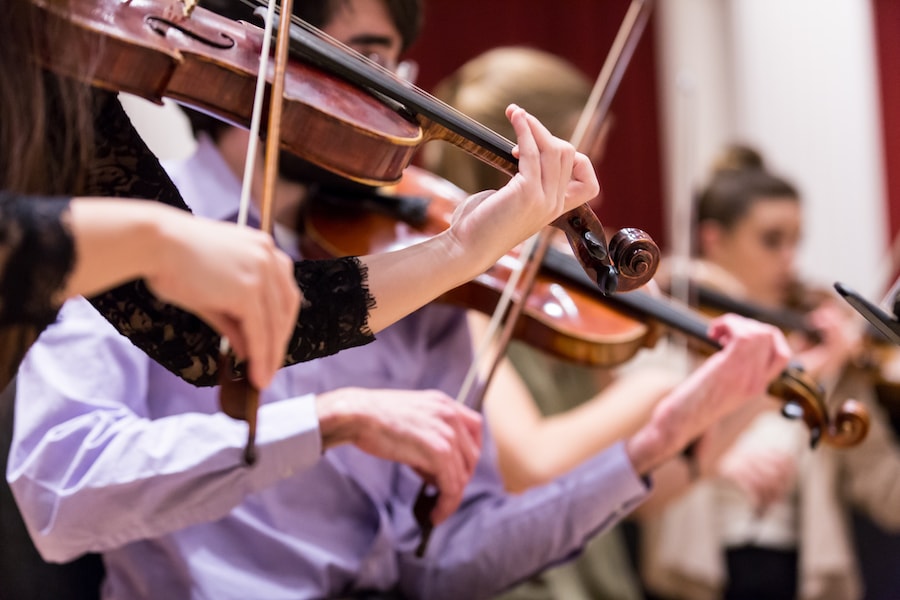Local concert life is about to become richer because the school of music at Carnegie Mellon University is expanding its offerings for the 2010-11 season. The music school has been named one of the top 10 in the nation by the author of Fiske Guide to Colleges. Starting in October, the school of music will introduce a new ensemble, the Carnegie Mellon Symphony, as well as present three special events.
“I thought it would be good to have an ensemble bigger than a chamber orchestra but not as large as the full philharmonic,” says Ronald Zollman, who became director of orchestral studies at the school in the fall of 2009.
Two of the pieces on the Carnegie Mellon Symphony’s debut program in October exemplify the repertoire Zollman has in mind — requiring few if any winds but a substantial string section. Ludwig van Beethoven’s Symphony No. 2 is scored for only pairs of winds, brass and timpani in addition to strings. Bela Bartok’s Music for Strings, Percussion and Celesta is written for two string orchestras, plus extra non-wind instruments.
The conductor says the symphony’s niche will allow it to be scheduled at the same time as the wind ensemble because the school has a large roster of wind and brass players. He intends the spring concert to be for divided string orchestra, such as Ralph Vaughan Williams Fantasia on a Theme of Thomas Tallis.
Dates for the Carnegie Mellon Symphony remain to be set, but performances will be in the Carnegie Music Hall in Oakland.
Special events
Pittsburgh Symphony principal oboist Cynthia DeAlmeida and colleagues will present a benefit concert over the Labor Day weekend for the Hopital Albert Schweitzer in Deschapelles, Haiti. The hospital was founded in 1956 by William Larrimer Mellon and his wife, Gwen.
The concert program will include a Sonata for oboe and piano by Alexander Wunderer and Trio for oboe, horn and piano by Carl Reinecke, with symphony principal horn William Caballero. Maria Lipinacci will be the pianist. Most of the program will be recorded for commercial release the week before the concert, which starts at 7:30 p.m. Sept. 4 at Kresge Theatre on the CMUcampus. Donations will be accepted.
The second special event will be a tribute to Pittsburgh pianist Earl Wild (1915-2010), who graduated from Carnegie Tech with a bachelor of fine arts degree in 1937. New York Times critic Harold C. Schoenberg called Wild “a super-virtuoso in the Horowitz class.” The tribute will include performances by Carnegie Mellon alumni, faculty and students. It stars at 3 p.m. Oct. 9 at Kresge Theatre. Admission is free. The school will celebrate the 200th anniversary of Frederic Chopin’s birth with “200 Hands Play 100 Works” at two concert halls in the Fine Arts building. The performances from noon to 10 p.m. on Oct. 30 and 31 are co-sponsored by Trombino Piano Gallerie, Downtown, and will help finance the acquisition and maintenance of a new Steinway B grand piano. Admission is free, but donations are appreciated.
Music school expanding
The extra concerts come as the school of music is expanding in other ways under Noel Zahler. At the start of his fourth year as the head of the school, Zahler says its enrollment is higher than ever and the faculty has been increased by four full-time tenure-track professors, including in history and theory. More spacious facilities are finally on the horizon, too.
Edward Fiske, author of Fiske Guide to Colleges, named Carnegie Mellon’s School of Music one of the top 10 in the country in part because of its collaborations with the theater, engineering and computer science schools at the university. The music school has worked on special projects with the Pittsburgh Symphony, Pittsburgh Opera and Pittsburgh Ballet Theatre.
The school presents hundreds of performances each season, ranging from baroque to contemporary music and encompassing fully staged productions of opera and musical theater.
“I get no bigger kick than hearing our students perform. It keeps me going stronger than anything else,” Zahler says.
